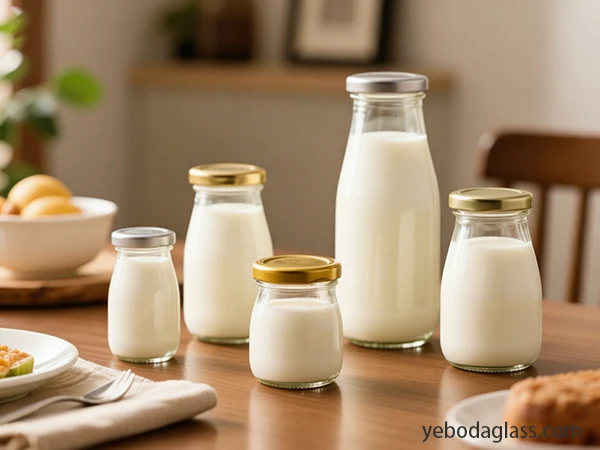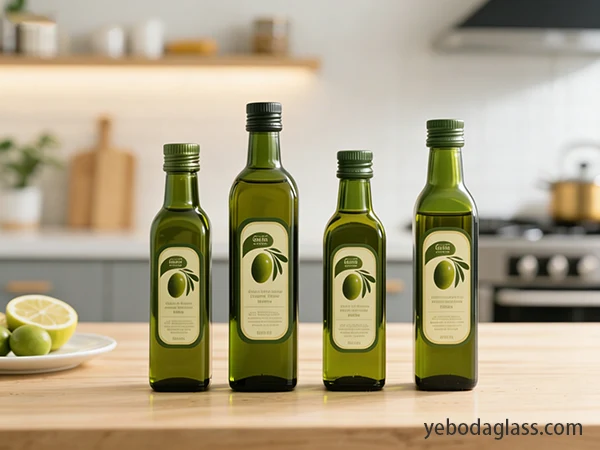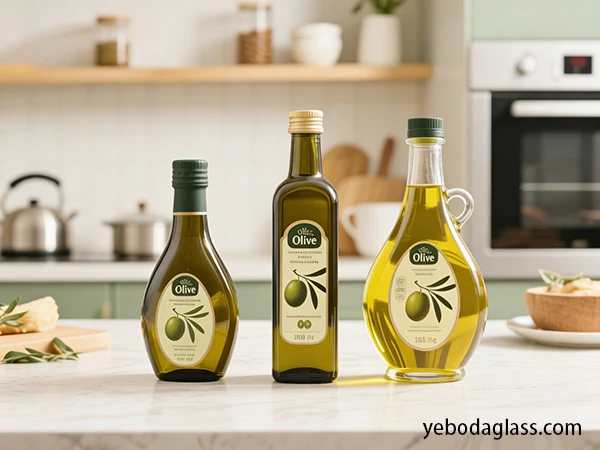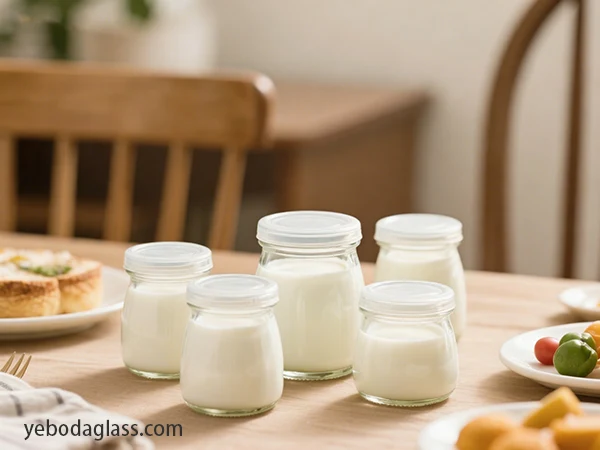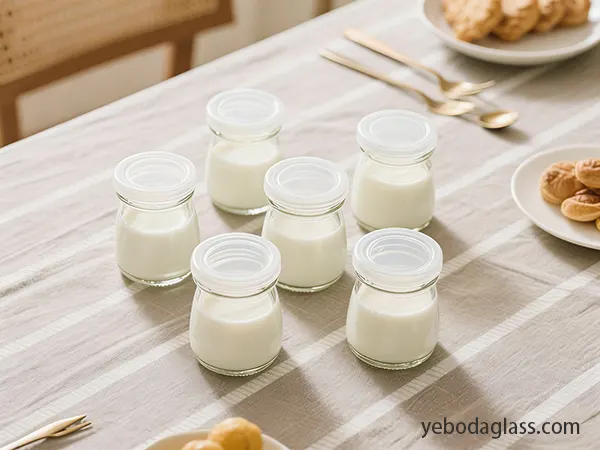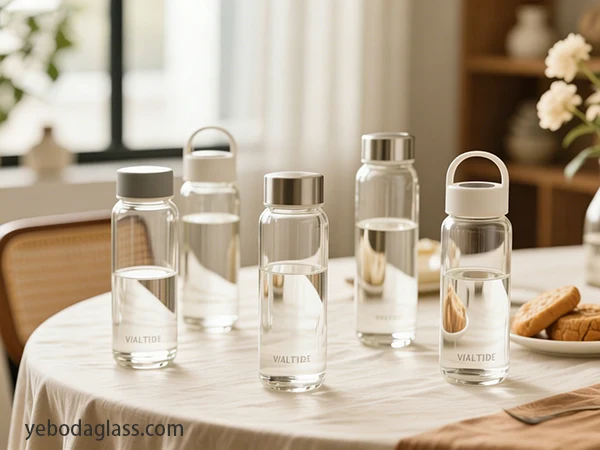Wprowadzenie
W miarę jak światowy popyt na miód stale rośnie, a różnorodność produktów się rozszerza, fabryka słoików z miodem Działalność firmy również dynamicznie się rozwija. Opakowania miodu zmieniły się drastycznie – z bezpiecznych i wydajnych stały się atrakcyjne wizualnie i przyjazne dla środowiska. Niniejszy raport na temat słoik miodu Przemysł wytwórczy to szczegółowa i benchmarkingowa analiza trendów rynkowych, które będą wiodącymi czynnikami kształtującymi branżę do 2026 roku. Wskazuje ona na główne obszary, takie jak innowacje technologiczne, zrównoważony rozwój środowiska, projektowanie opakowań, łańcuch dostaw i regulacje, które uległy zmianie. Yeboda, jedna z najlepszych fabryk słoików na miód, jest znana z wykorzystywania zaawansowanych technologii, wysokiej jakości oraz inteligentnej integracji produkcji szkła z ekologicznymi praktykami. Dzięki połączeniu technologii i kunsztu, Yeboda staje się wzorem dla światowych producentów, którzy chcą zwiększyć wydajność, zmniejszyć swój ślad węglowy i nadążać za zmieniającymi się wymaganiami klientów B2B i detalicznych.

Innowacje technologiczne w branży produkcji słoików na miód
Przemysł 4.0 i automatyzacja
Czwarta rewolucja przemysłowa (Przemysł 4.0) zmienia podstawowe procesy w fabrykach słoików na miód, podobnie jak miałoby to miejsce w każdej innej fabryce. Do głównych zalet wykorzystania na przykład automatyzacji i robotyki (kobotów) należą redukcja kosztów i spójność produktów; co w efekcie przekłada się na ekonomikę dla fabryki słoików na miód. Ponadto technologie te zwiększają elastyczność produkcji, umożliwiając wydajną produkcję słoików na miód o różnych kształtach i rozmiarach, a nawet zamknięć. We współczesnych zakładach produkujących słoiki szklane bezpieczeństwo i niezawodność wykonywania zadań rutynowych lub wymagających precyzji wzrasta, gdy roboty wykonują te zadania, dając operatorom możliwość skupienia się na innowacyjnym projektowaniu i zapewnianiu jakości. Fabryka słoików na miód w Yeboda jest dobrym przykładem, ponieważ umożliwia inteligentnym systemom automatyzacji integrację etykietowania, napełniania i kontroli jakości za pośrednictwem sieci danych w czasie rzeczywistym. Dlatego też takie połączenie umożliwia skrócenie czasu przestoju maszyny, zwiększenie wydajności i dostosowanie się do zmian w celu ciągłego doskonalenia opartego na danych.
Digitalizacja i produkcja oparta na danych
Przemysłowy Internet Rzeczy (IIoT), systemy MES (Manufacturing Execution Systems) i planowanie zasobów przedsiębiorstwa (ERP) umożliwiły pełną łączność w obrębie fabryki produkującej słoiki z miodem, zapoczątkowując tym samym cyfrową transformację. Monitorowanie w czasie rzeczywistym każdego etapu – od zaopatrzenia w surowce, przez formowanie butelek szklanych, po końcowe pakowanie – jest teraz możliwe. Ten scenariusz pełnych powiązań i interakcji stwarza sprzyjające warunki dla dogłębnej analityki i predykcyjnych analiz, ponieważ pozwala firmom działać z minimalną ilością odpadów, przewidywać potrzeby konserwacyjne i poprawiać efektywność energetyczną. W szczególności sztuczna inteligencja (AI) i uczenie maszynowe (ML) mogą usprawnić predykcję konserwacji i kontrolę jakości, wykorzystując zautomatyzowane systemy wizyjne do kontroli czystości, grubości i precyzji zamknięcia każdego słoika z miodem. Co więcej, funkcje te są niezwykle ważne dla dużych producentów, takich jak Yeboda, którzy wykorzystują je w celu utrzymania doskonałości operacyjnej, zagwarantowania spójności produktów, a nawet prześcignięcia konkurencji poprzez ciągłe innowacje.
Zrównoważony rozwój i strategie gospodarki o obiegu zamkniętym w produkcji słoików na miód
Efektywność energetyczna i redukcja śladu węglowego
Zrównoważony rozwój zmienił się z prostej preferencji korporacyjnej w niezbędny filar strategiczny fabryki słoików z miodem pod każdym względem. Redukcja ogólnej emisji dwutlenku węgla i osiągnięcie efektywności energetycznej stały się priorytetami. Optymalizacja pieców do topienia, wykorzystanie alternatywnych paliw o niskim wpływie na środowisko oraz instalacja urządzeń do odzysku ciepła to główne kroki w kierunku osiągnięcia tych celów.
Materiały pochodzące z recyklingu i odnawialne
Wykorzystanie materiałów pochodzących z recyklingu pokonsumenckiego (PCR) ma ogromne znaczenie dla skoordynowanego zamykania cyklu życia produktu. Aby to udowodnić, PCR słoiki szklane Zmniejszają zapotrzebowanie na energię i zużycie surowców, jednocześnie drastycznie redukując emisje. Z drugiej strony, rPET i rHDPE robią postępy dzięki procesom recyklingu chemicznego, które oczyszczają i poprawiają ich właściwości.
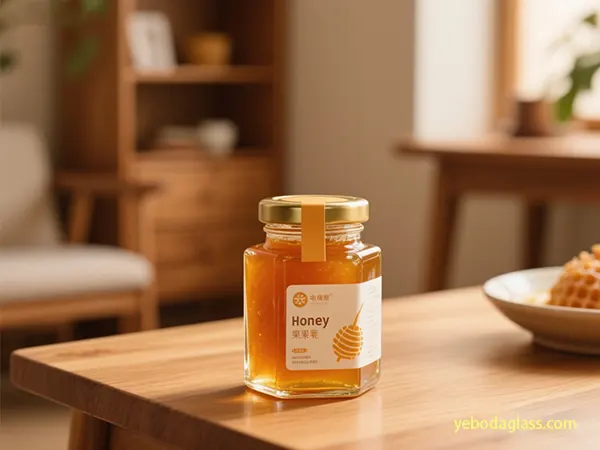
Nowe biotworzywa i modele gospodarki o obiegu zamkniętym
Badania nad bioplastikami i materiałami biodegradowalnymi jako alternatywą dla obecnych rozwiązań trwają i trwają, a ich celem jest oferowanie rozwiązań skalowalnych i płynnie integrujących się z istniejącymi łańcuchami wartości. Taktyki gospodarki o obiegu zamkniętym obejmują projektowanie słoików na miód, które w dużym stopniu nadają się do recyklingu, proaktywne minimalizowanie odpadów podczas produkcji oraz dalszy rozwój modeli ponownego użycia lub napełniania, które wydłużają żywotność produktu. Praktyki te, przyjęte przez innowacyjną fabrykę słoików na miód, nie tylko stanowią silny dowód poparcia dla globalnych celów zrównoważonego rozwoju, ale także sprawiają, że fabryka ta jest ulubionym miejscem firm stosujących zielone strategie, a także ekologicznych konsumentów.
Projektowanie opakowań i preferencje konsumentów dotyczące słoików z miodem
Ergonomia, funkcjonalność i wygoda
Projekt opakowania odgrywa kluczową rolę w decyzji zakupowej konsumenta. Ergonomia i funkcjonalność słoików na miód to w zasadzie główne czynniki wpływające na zadowolenie użytkownika. Dotyczy to wygodnych w trzymaniu kształtów, szerokich otworów ułatwiających napełnianie i czyszczenie oraz nowych systemów dozowania, które zapobiegają kapaniu i umożliwiają precyzyjną kontrolę porcji.
Branding, estetyka i personalizacja
Zróżnicowanie marki osiąga poziom rozpoznawalności dzięki unikatowym kształtom słoików, eleganckiemu wykończeniu i wyrafinowanym technikom etykietowania, które pomagają markom szybko i wizualnie przekazać tożsamość. Stosowanie szklanych słoików to cichy komunikat, ale świadczy o najwyższych standardach czystości i jakości produktu, które są dwoma głównymi atutami rynku miodu. Zarówno konsumenci, jak i producenci są motorem napędowym trendu, który koncentruje się na premiumizacji, wygodzie i zrównoważonym rozwoju. Najbardziej faworyzowani będą producenci estetyczni, którzy potrafią połączyć piękno z praktycznością. Jedna z najlepszych fabryk słoików na miód łączy usługi personalizacji marki, aby produkt wyróżniał się na nasyconym rynku, jednocześnie utrzymując stały poziom produkcji.
Optymalizacja i odporność łańcucha dostaw
Systemy Just-in-Time i Traceability
Łańcuch dostaw musi być odporny, co jest obecnie strategiczną potrzebą. Częścią tego są systemy logistyczne Just-in-Time (JIT) oraz narzędzia pełnej identyfikowalności, takie jak kody QR, tagi RFID i technologie blockchain. Identyfikowalność w fabryce słoików z miodem umożliwia śledzenie każdej jednostki, od miejsca pozyskania surowców, aż po dostawę do użytkownika końcowego.
Svázání zavařovací sklenice s víčkem a štítkem vyřeší vaše potřeby balení.
Inteligentna dywersyfikacja dostawców wraz z lokalnym pozyskiwaniem to fundament niezawodnego łańcucha dostaw. Metody nearshoringu i reshoringu zmniejszają zależność od odległych rynków, a szczegółowe planowanie awaryjne łagodzi skutki zakłóceń.
Integracja technologiczna i współpraca w czasie rzeczywistym
Integracja platform cyfrowych między dostawcami a klientami umożliwia wymianę danych w czasie rzeczywistym i wspólne prognozy popytu. Ten poziom synchronizacji przekłada się na szybką reakcję na zmieniające się sytuacje, mniejszą ilość odpadów i poprawę efektywności kosztowej – dzięki czemu cały ekosystem produkcji słoików na miód staje się bardziej elastyczny i zrównoważony.
Ramy regulacyjne i zgodności
Normy i przepisy dotyczące materiałów spożywczych w fabryce słoików z miodem
Przepisy dotyczące słoików szklanych i fabryk miodu są coraz bardziej zaostrzone. FDA i EFSA to jedne z pierwszych organizacji, które przychodzą na myśl, gdy mowa o rygorystycznych normach regulujących bezpieczeństwo materiałów i środki ochrony przed kontaktem z żywnością. Od producentów wymaga się również posiadania certyfikatów, takich jak ISO 22000 dla systemów zarządzania bezpieczeństwem żywności.

Etykietowanie, przejrzystość i informacje dla konsumentów
Nowe wymogi dotyczące etykietowania są bardziej przejrzyste i zawierają więcej szczegółów, na przykład dotyczących zawartości materiałów pochodzących z recyklingu, śladu węglowego i możliwości recyklingu. Stworzenie sposobów etykietowania produktu, takich jak kody QR, umożliwia klientowi dostęp do rozszerzonych informacji o produkcie i historii marki bezpośrednio na opakowaniu.
Przepisy dotyczące zrównoważonego rozwoju i rozszerzona odpowiedzialność producenta
Oprócz celów dotyczących zawartości materiałów pochodzących z recyklingu, którym towarzyszą zakazy stosowania tworzyw sztucznych jednorazowego użytku, rządy wdrażają programy Rozszerzonej Odpowiedzialności Producenta (EPR). Przewidując i spełniając te rozwijające się przepisy, proaktywna fabryka słoików z miodem nie tylko będzie ich przestrzegać, ale będzie mogła wykorzystać tę zgodność jako powód do wyróżnienia się na tle innych, zwiększając w ten sposób zaufanie do marki i wiarygodność w zakresie ochrony środowiska.
Implikacje strategiczne i możliwości biznesowe
Innowacja i przewaga konkurencyjna
Zidentyfikowane trendy mają dwojaki charakter: stanowią zarówno wyzwania, jak i szanse. Jedną z najbardziej zauważalnych korzyści, jakie firma zyskuje w zakresie efektywności operacyjnej i innowacji produktowych, jest inwestowanie w automatyzację, sztuczną inteligencję i robotykę. Wiąże się to jednak z wysokimi wymaganiami kapitałowymi oraz zapotrzebowaniem na wykwalifikowaną siłę roboczą.
Zrównoważony rozwój jako wyróżnik marki
Aktywne działanie na rzecz zrównoważonego rozwoju nie tylko wzmocni reputację firmy, ale także stanie się przepustką do rynków premium. Producenci stają się odpowiedzialnymi i przyszłościowymi dostawcami, decydując się na produkcję szklanych butelek i słoików na miód nadających się do recyklingu.
Współpracujące łańcuchy wartości
Partnerskie podejście między dostawcami, partnerami technologicznymi i klientami jest warunkiem sine qua non rozwoju innowacyjności i odporności. Fabryka miodu, która nawiązuje takie partnerstwo, stwarza okazję do przygotowania się na wszelkie zakłócenia, optymalnego wykorzystania zasobów i czerpania korzyści z bycia po zwycięskiej stronie ciągłego doskonalenia w całym łańcuchu dostaw.
Perspektywy i wnioski na przyszłość dla sektora fabryk słoików na miód
Wizja przyszłości na rok 2026 i kolejne lata
Przyszła fabryka słoików z miodem będzie w pełni zdigitalizowana, będzie wykorzystywać czystą energię i recykling materiałów. Firmy opakowaniowe nowej generacji będą korzystać z monitoringu w czasie rzeczywistym, predykcyjnego utrzymania ruchu opartego na sztucznej inteligencji oraz modeli produkcji bezodpadowej. Popularność ekologicznych szklanych słoików i opakowań wielokrotnego użytku zmieni rynek, dostosowując się do globalnych porozumień w zakresie zrównoważonego rozwoju i preferencji konsumentów dotyczących szczerych i otwartych praktyk.

Zalecenia końcowe
Producenci, którzy chcą być konkurencyjni i utrzymać swoją pozycję na rynku, muszą:
- stawiaj na technologie Przemysłu 4.0 w celu zwiększenia efektywności i zdolności adaptacji.
- octubre 15, 2025
- Asóciate con un fabricante líder de botellas de leche para reducir costes y aumentar la eficiencia. Descubre soluciones sostenibles e innovadoras para tus necesidades de envasado.
- El objetivo de este informe es mejorar el abastecimiento y suministro de botellas de leche mediante una estrecha colaboración con fabricantes especializados en este tipo de envases. Esta iniciativa se centra menos en la compra de productos y más en una alianza estratégica que facilita ahorros inmediatos en materias primas, producción y logística, además de generar beneficios continuos en sostenibilidad, innovación y resiliencia. Esto se logra mediante una alianza bien organizada con un socio cualificado.
- fabricante de botellas de leche
Una empresa no solo garantiza un suministro estable y de buena calidad, sino que también tiene la oportunidad de utilizar nuevas tecnologías de envasado, transparencia de costes y el potencial de innovación conjunta. En definitiva, este sistema permite a las empresas aumentar sus beneficios y mantenerse competitivas en el cambiante mercado global del envasado. Como ejemplo, Yeboda, una empresa de envases de vidrio de alta calidad.

